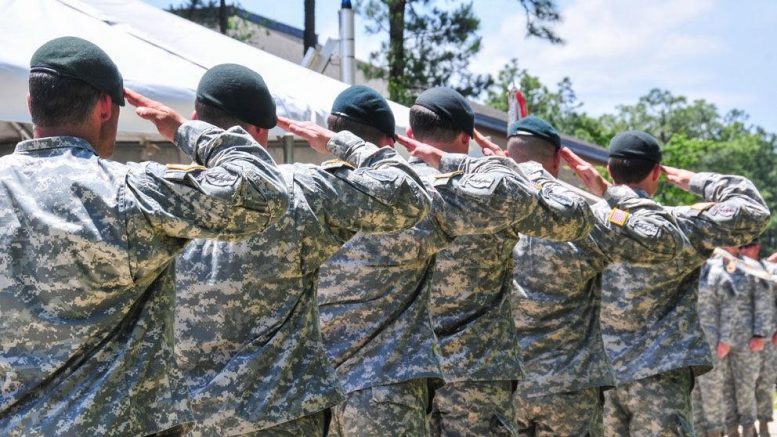A former Fort Bragg soldier filed a class-action lawsuit Monday alleging that the Army has failed to consider the effects of post-traumatic stress syndrome on veterans who received less-than-honorable discharges.
Stephen Kennedy, a former 82nd Airborne Division soldier who now lives in Fairfield, Connecticut, alleges in the lawsuit that Army discharge review boards have consistently failed to abide by a secretary of defense directive that requires them to consider upgrading the discharge status of soldiers who have been diagnosed with PTSD.
The lawsuit, filed through the Yale Law School Veterans Services Clinic, could benefit more than 59,000 veterans who suffered from PTSD during the wars in Iraq and Afghanistan, said Jordan Goldberg, a law student intern at the clinic who was among those filing the lawsuit on behalf of Kennedy and another veteran, Alicia Carson of Alaska.
Goldberg said that in 2014, then Secretary of Defense Chuck Hagel issued a memo telling the Army Discharge Review Board to apply liberal consideration of discharge orders when a soldier is known to suffer from PTSD or other mental health conditions.
Goldberg said the Yale clinic analyzed discharge cases from 2015 and found that Hagel’s directive was not applied or even mentioned in half of the soldiers who had PTSD and received other-than-honorable discharges. The review board was established to give soldiers a second chance, Goldberg said.
An other-than-honorable discharge can have grave consequences for veterans, imposing a lifetime of stigma, making it harder for them to find jobs and denying them access to government services, including the GI bill, mental health treatment and disability benefits.
Kennedy could not immediately be reached for comment. But he explained his circumstances in a clinic news release.
“As my PTSD became impossible to manage on my own, my commander told me that the only way I could receive treatment was by leaving the Army with a bad paper discharge,” said Kennedy, now the leader of the Connecticut chapter of Iraq and Afghanistan Veterans of America. “Just like that, the Army wiped away years of distinguished service to my country and deemed it less than honorable.”
The news release also quoted U.S. Sen. Richard Blumenthal of Connecticut.
“This cause is a matter of justice, plain and simple,” Blumenthal said. “I strongly support this legal action to assure that veterans suffering from post-traumatic stress receive the medical care and recognition they deserve. A lawsuit is necessary because the Pentagon is failing to adequately review bad paper discharges resulting from post-traumatic stress and other invisible wounds of war.”
According to the lawsuit, Kennedy served in the 82nd Airborne’s 2nd Battalion, 504th Parachute Infantry Regiment. He was deployed to Iraq from June 2007 to July 2008, serving as a Humvee turret gunner and a machine gun operator.
During the first part of his deployment, Kennedy’s unit provided route clearance and security for a supply convoy in an area where improvised explosive devices were common.
From March to July of 2008, the lawsuit says, Kennedy’s unit was responsible for disrupting al-Qaida supply lines through the villages of Anbar and Saladin provinces. On two occasion, an insurgent detonated a suicide vest.
Kennedy was promoted and received the Army Commendation Medal at the end of the deployment. He also was awarded the Combat Infantryman Badge, the lawsuit says.
Although Kennedy continued to thrive as a leader after his return to Fort Bragg, his PTSD symptoms began to emerge.
“He began to self-isolate, had trouble sleeping, avoided stressful situations, and suffered from ‘survivor’s guilt’ and depression,” according to the lawsuit. “He had no sense of a future, feeling as if he was still waiting for the IED that should have killed him in Iraq.
“He started to drink heavily, abusing alcohol to soothe his PTSD symptoms.”
The lawsuit says Kennedy began to physically harm himself. On several occasions, it alleges, he walked around Fayetteville late at night, hoping to be mugged or attacked. He also began having suicidal thoughts and serious relationship and financial problems.
Kennedy did not seek help for his mental health struggles because he feared being labeled weak and losing the trust of members of his unit, the lawsuit alleges.
“By March 2009, Mr. Kennedy’s mental health issues had grown dire without treatment,” the lawsuit says.
That year, Kennedy went Absent Without Leave to attend his wedding ceremony, the lawsuit says.
Afterward, a psychologist said the Army lacked the resources to provide Kennedy with therapy to address his major depressive disorder and recommended that he be administratively discharged.
“Because Mr. Kennedy had gone AWOL,” the lawsuit contends, “his new commander opted to discharge him for the commission of a ‘serious offense’ and lowered the characterization of his discharge to General.”
As a veteran, Kennedy went into treatment for PTSD and “has returned to demonstrating the character and excellence that defined much of his service in the Army,” according to the lawsuit.
It says Kennedy earned a bachelor’s degree from the University of Massachusetts Boston and now attends school for biophysical chemistry at New York University. He expects to earn his Ph.D. in 2017. He is married and has a daughter.
Staff writer Greg Barnes can be reached at gbarnes@fayobserver.com or 486-3525




